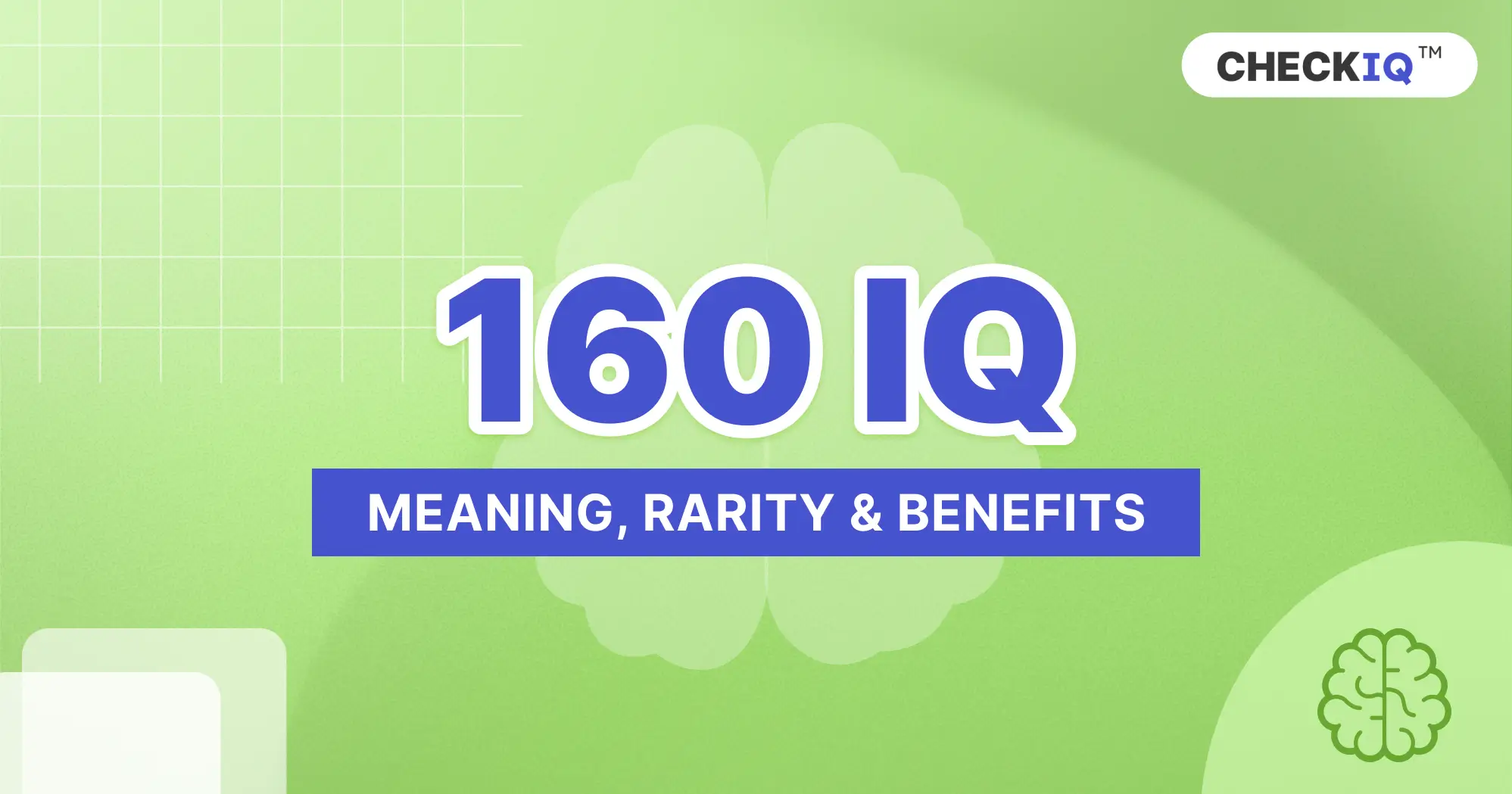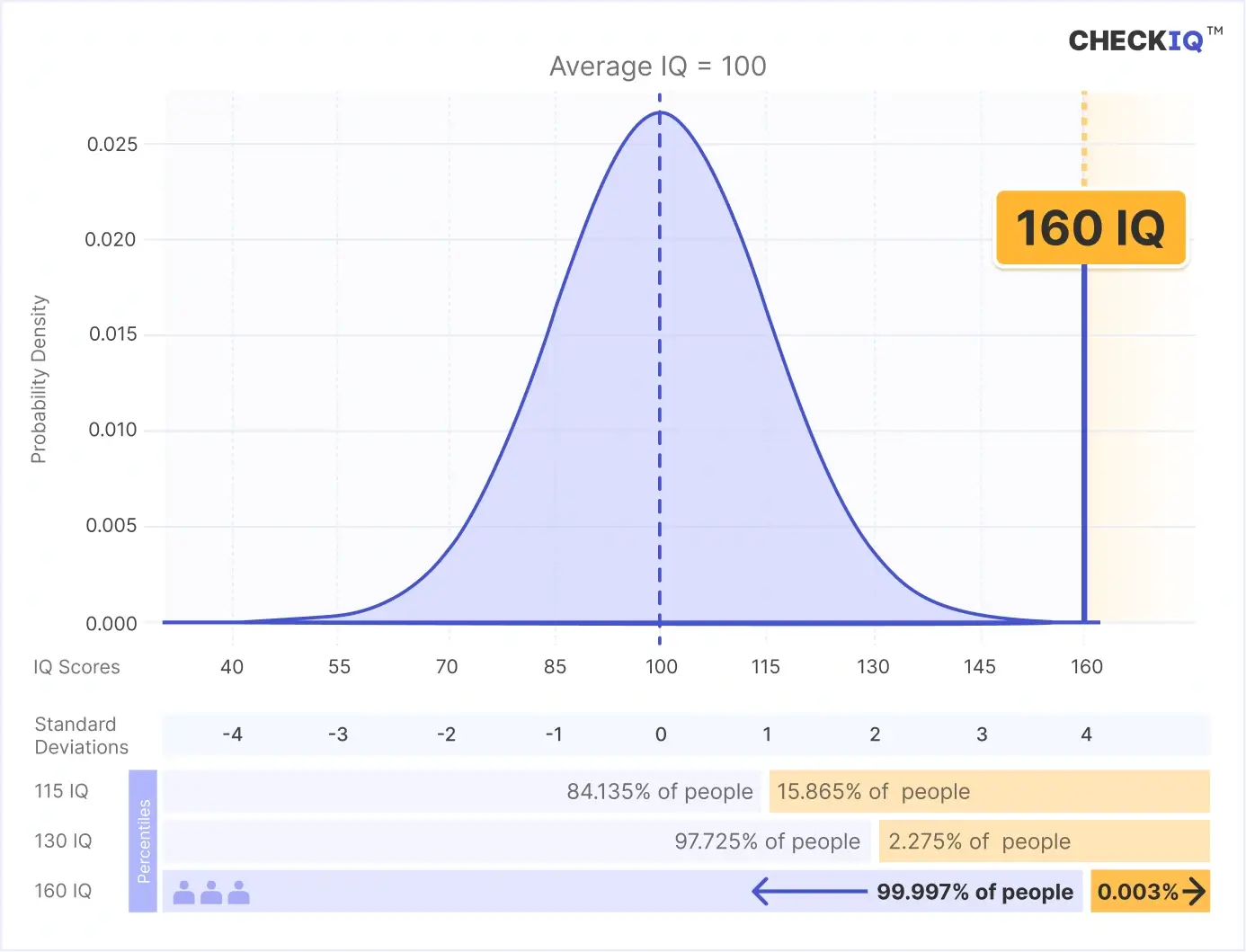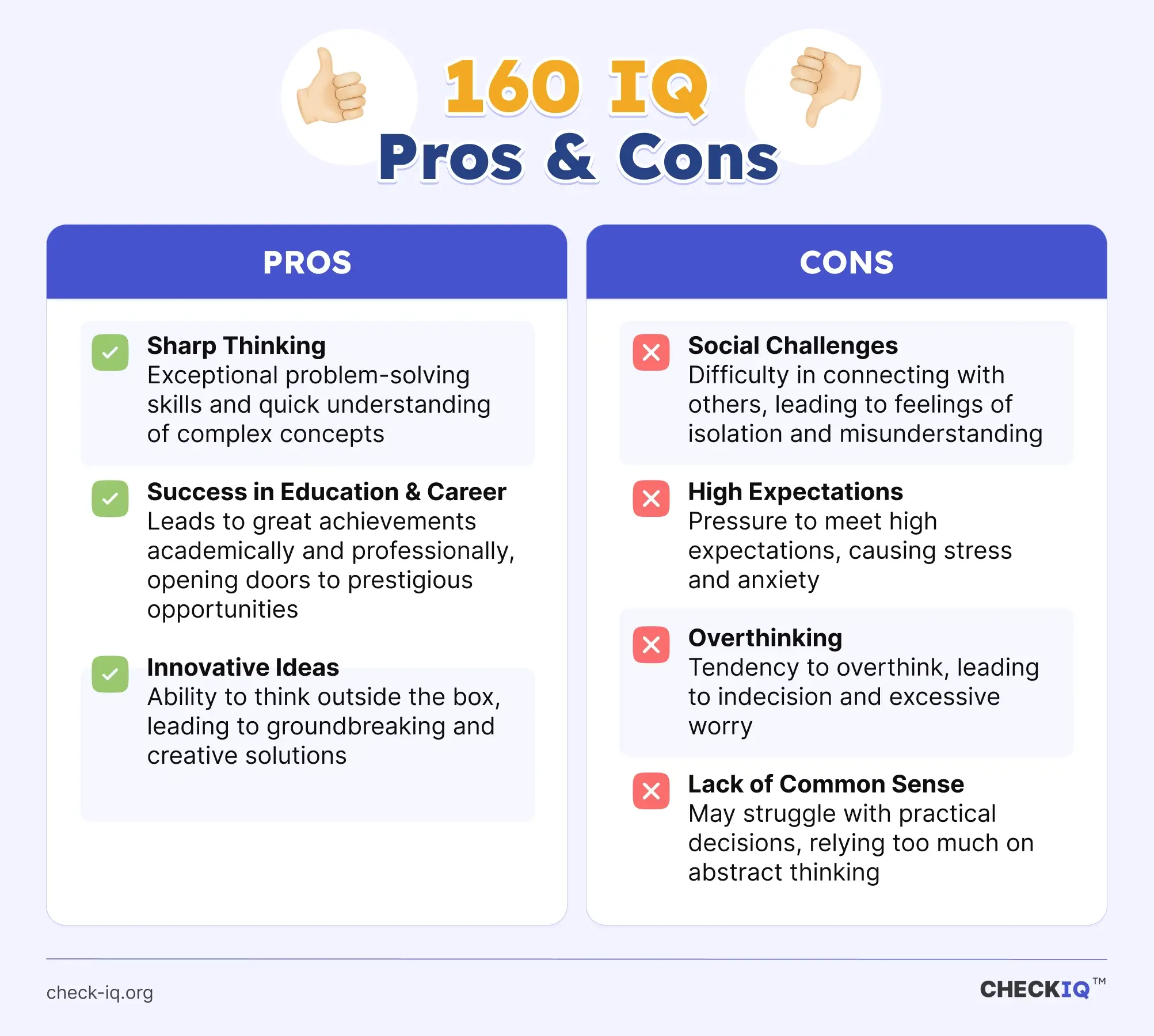160 IQ: Meaning, Percentile and Rarity

Discover the characteristics of an IQ of 160 / Image by CheckIQ
Albert Einstein and Stephen Hawking are both believed to have had an IQ around 160. These extraordinary minds have inspired countless people. Without a doubt, they have also sparked curiosity about what it means to have such a high IQ.
As you can guess, 160 IQ isn’t common. In this article, we’ll explore what it truly means, why it’s so rare, and, among other common questions, we’ll debunk a few myths. We’ll also list some of the people known to have a 160 IQ.
|
WHAT A 160 IQ MEANS IN KEY FIGURES |
|
|
IQ Level |
160 |
|
Percentile |
99.997th |
|
Top % of Population |
Top 0.003% |
|
Rarity |
1 in 31,560 people |
1. What Does an IQ of 160 Mean?
The meaning behind a 160 IQ score
An IQ score measures your cognitive abilities relative to the general population, where higher scores indicate stronger skills in reasoning, problem-solving, and understanding complex concepts. Most IQ tests set one standard deviation at 15 points. In statistics, a standard deviation measures how spread out values are from the average. In short, a standard deviation tells us how much a typical score deviates from the average.
For IQ, this means that a 160 score, which is four standard deviations above the average IQ of 100, is calculated as 4 times 15 points higher than 100.
What percentile does an IQ of 160 correspond to?
An IQ of 160 corresponds to the 99.997th percentile for most IQ classifications, using a standard deviation of 15. This means you are smarter than 99.997% of the population and fall within the top 0.003%. Using a standard deviation of 16, like the older version (4th Edition) of the Stanford-Binet test, a 160 IQ translates into a 99.991% percentile or top 0.009%.
This level of IQ score is extraordinary, indicating that you are likely a fast learner with a strong memory, which often correlates with a high IQ, and advanced problem-solving skills. This often translates into outstanding academic performance and excellence in complex fields requiring deep analytical thinking.

Is a 160 IQ good?
Yes, a 160 IQ is not just good – it’s extraordinary. At this level of very high IQ, your cognitive abilities far surpass those of the average person, placing you among the intellectual elite. People with an IQ of 160 often excel in complex problem-solving, abstract thinking, and creative endeavors. They may find themselves naturally drawn to fields that require deep analytical skills, such as theoretical physics, advanced mathematics, or philosophy.
2. Classification & Standardized Tests Equivalents
Now that we know what a 160 IQ level represents, let’s see how it is classified across various intelligence scales and how it translates to equivalent scores on standardized tests.
Which IQ range & classification does an IQ of 160 correspond to?
Here’s how a 160 IQ score compares to the classifications on the most popular IQ scales:
|
IQ Scale |
IQ Range |
IQ Classification |
|
Current Wechsler Adult Intelligence Scale of Intelligence (WAIS–IV) |
130 and above |
Very superior |
|
Current Wechsler Preschool and Primary Scale of Intelligence (WPPSI–IV) |
130 and above |
Very superior |
|
Wechsler Intelligence Scale for Children – Fifth Edition (WISC–V) |
130 and above |
Extremely high |
|
Stanford-Binet Fifth Edition |
140 and above |
Very gifted or highly advanced |
|
Woodcock-Johnson R |
131 and above |
Very superior |
|
Kaufman Adolescent and Adult Intelligence Test (KAIT 1993) |
130 and above |
Upper extreme |
|
Kaufman Assessment Battery for Children (KABC-II 2004) |
131 to 160 |
Upper extreme |
|
Cognitive Assessment System 1997 |
130 and above |
Very superior |
|
Differential Ability Scales (DAS-II 2007 GCA) |
130 and above |
Very high |
|
Reynolds Intellectual Ability Scales (RIAS) |
130 and above |
Significantly above average |
Intelligence tests use various terms. A 160 IQ corresponds to:
- “Very superior” IQ classification for the Wechsler Adult Intelligence Scale of Intelligence (WAIS-IV), the Wechsler Preschool and Primary Scale of Intelligence (WPPSI–IV), the Woodcock-Johnson, and the Cognitive Assessment System
- “Extremely high” for the Wechsler Intelligence Scale for Children – Fifth Edition (WISC–V)
- “Very gifted” for the Stanford-Binet Fifth Edition
- “Upper Extreme” for the Kaufman Adolescent and Adult Intelligence Test (KAIT 1993) and the Kaufman Assessment Battery for Children (KABC-II 2004)
- “Very high” for the Differential Ability Scales (DAS-II 2007 GCA)
- “Significantly above average” for the Reynolds Intellectual Ability Scales (RIAS)
In short, all these IQ scales recognize the exceptional cognitive abilities of someone with a 160 IQ.
Note that most of the IQ Scales have an IQ ceiling of 160. For example, the Wechsler scales can measure up to and sometimes slightly above 160, but scores of 160 are often at the upper limit. Older versions of Wechsler tests, like the WISC-III, could go as high as 200.
- Weiss et al. 2006, Table 5 Qualitative Descriptions of Composite Scores
- Kaufman, Alan S.; Engi Raiford, Susan; Coalson, Diane L. (2016). Intelligent Testing With the WISC-V. Hoboken, New Jersey: John Wiley & Sons. p. 237. ISBN 978-1-118-58923-6.
- Sattler 2008, inside back cover
- Kamphaus 2005, p. 337
- Urbina 2011, Table 2.1 Major Examples of Current Intelligence Tests
- Kaufman et al. 2005, Table 3.1 Descriptive Category System
- Gallagher & Sullivan 2011, p. 347
- Naglieri 1999, Table 4.1 Descriptive Categories of PASS and Full Scale Standard Scores
- Dumont, Willis & Elliot 2009, Table Rapid Reference 5.1 DAS-II Classification Schema
- Reynolds & Kamphaus 2003, p. 30 Table 3.2 RIAS Scheme of Verbal Descriptors of Intelligence Test Performance
Standardized test scores equivalent to 160 IQ (GRE, GMAT, SAT, etc)
If you've been to college, you've probably taken one of the popular standardized tests like the GRE, SAT, GMAT, or LSAT. While these tests measure different skills than an IQ test, we can still make some rough comparisons to help you understand what your standardized test score might translate to in terms of IQ.
If we assume a percentile of 99.997%, which corresponds to an IQ of 160, here are the equivalent scores on other standardized tests:
|
Standardized Test |
Score equivalent to 160 IQ |
|
ACT |
~ 36 |
|
GMAT |
770 |
|
GRE (verbal reasoning) |
170 |
|
GRE (quantitative reasoning) |
170 |
|
GRE (analytical writing) |
6.0 |
|
LSAT (scaled score) |
178 |
|
MCAT |
522 to 524 |
|
SAT |
1570 to 1600 |
These scores indicate that if you score in the top 0.003% on these standardized tests, your performance is comparable to having an IQ of 160.
Let's break this down:
- ACT: a score close to the perfect score of 36 on the ACT is comparable to an IQ of 160, from a percentile standpoint, according to the official ACT Score National Ranks. Indeed, a 35 score corresponds to the 99% percentile, while a 36 score corresponds to the 100% percentile.
- GMAT: according to the Graduate Management Admission Council, a 770 GMAT puts you in the 99.7% percentile. This is the same elite club you’ll need to be part of if you want a 160 IQ.
- GRE: according to ETS, a 99% percentile at the verbal reasoning part at the GRE corresponds to a scaled score of 170 (the maximum in the table published on ETS website). To achieve such a score, you’ll need to be in the 94% percentile in the GRE Quantitative Reasoning. This means that you’ll be in the top 6%. For the GRE Analytical Writing, the highest score of 6.0 corresponds to the 99% percentile.
- LSAT: according to the Law School Admission Council, achieving a scaled score of 178 on the LSAT means you're in the top 0.003%, similar to an IQ of 160.
- MCAT: If you scored between 522 and 524 at MCAT, you’re in the top 1% according to the Association of American Medical Colleges, and your percentile is equivalent to that of a 160 IQ.
- SAT: if you score between 1570 and 1600 at the SAT, you’re in the 99th+ percentile, according to the College Board. This is almost as hard getting a 160 IQ, which corresponds to the 99.7% percentile.
If you achieve these scores, you are among the best of the best, just like someone with an IQ of 160. This can open doors to prestigious educational and professional opportunities.
3. Rarity of 160 IQ
If you have a 160 IQ, you already belong to a rare and elite group of people with some of the highest IQ scores on the planet.
How rare is an IQ of 160?
An IQ of 160 is extremely rare. If you have an IQ of 160, you are truly exceptional. By definition, only 1 in 31,560 people has an IQ that high. This means you are considered a "genius," as the typical cutoff for genius-level IQ is around 145.
High IQ society that accepts an IQ of 160
With a 160 IQ, you’ll be eligible for most high IQ societies. Here are some examples:
-
Mensa: requires an IQ of 130, placing you in the top 2% of the population. Thus, an IQ of 160 far exceeds the requirement for Mensa.
-
Intertel: requires an IQ of 135, putting you in the top 1% of the population. Again, a score of 160 easily qualifies.
-
Triple Nine Society: accepts individuals with an IQ of 146, which is the top 0.1%. With a 160 IQ, you’d surpass this threshold comfortably.
-
Epimetheus Society: this exclusive society is specifically for those with an IQ of 160, placing you in the top 0.003% of the population. With a 160 IQ score, you’d meet the exact requirement for this elite group.
However, even with a genius IQ of 160, there are some ultra-elite high IQ societies that you won't be able to access due to their extremely high entry requirements:
-
Mega Society: This society requires you to be among the top 0.0001% of scorers on standardized IQ tests, with an IQ of 172 (σ=15). Unfortunately, a 160 IQ won't meet this high threshold.
-
Giga Society: To join, you need an IQ of 190, which places you in the 99.9999999th percentile, or 1 in a million. A 160 IQ falls short of this requirement.
Try our accurate online IQ Test. Get your IQ score immediately.
Start IQ Test
4. Which Celebrities Have an IQ of 160?
Some of the people reported to have an IQ of 160 and above include:

- Stephen Hawking, a theoretical physicist
Hawking made groundbreaking contributions to our understanding of black holes and authored the best-selling book "A Brief History of Time."
→ Find out more about Stephen Hawking’s 160 IQ.
- Quentin Tarantino, movie director
The acclaimed director of "Reservoir Dogs" and "Pulp Fiction" revolutionized independent cinema with his distinctive storytelling and dialogue.
→ Find out more about Quentin Tarantino’s 160 IQ.
- Dolph Lundgren, actor
Famous for playing Drago in "Rocky IV," Dolph earned a master's degree in chemical engineering and attended MIT on a Fulbright Scholarship.
→ Find out more about Dolph Lundgren’s 160 IQ.
- Albert Einstein, theoretical physicist
Probably the most famous genius in this list, Albert Einstein is known for his theory of relativity. He changed the course of modern physics with his revolutionary ideas on space, time, and energy.
→ Find out more about Albert Einstein’s 160 IQ.
- Ashton Kutcher, actor and tech investor
Ashton Kutcher has successfully transitioned from a career in entertainment to become a significant player in the tech industry, investing in numerous successful startups.
→ Find out more about Ashton Kutcher’s 160 IQ.
- Steve Jobs, co-founder of Apple
Steve Jobs was a visionary entrepreneur who revolutionized personal computing, music, and mobile phones. He left a lasting impact on the tech industry.
→ Find out more about Steve Jobs’s 160 IQ.
A few words on those celebrities IQ scores
The media loves to tell stories of famous people with high IQ scores. You might have read about celebrities with IQs over 160, but take these reports with a grain of salt. Many of these scores are estimates or based on non-standardized tests, not firm fact.
Be cautious of sites that don't cite their sources for IQ scores or fail to provide any confidence level for the metric. You need to always look for reliable and well-documented data to ensure accuracy and trustworthiness.
And just remember, an IQ score, whether it's a celebrity's or your own, is one of many measures of intellect. It is not an absolute indicator of a person's abilities or potential.
Try our 100% adaptive online IQ Test. Get your IQ score within minutes.
Launch IQ Test
5. Pros and Cons of Having a 160 IQ
Imagine being one of the smartest people in the world, with an IQ of 160. It really seems incredible. However, there are both benefits and challenges that come with such high intelligence. Let's explore the pros and cons of having a high IQ, drawing on research and real-life examples.
Pros of having a 160 IQ
- Sharp Thinking: With an IQ of 160, you have exceptional problem-solving skills and the ability to understand complex concepts quickly. This can make learning new things exciting and fulfilling. According to Torkel Klingberg, a professor of cognitive neuroscience, intelligence predicts success in areas like school performance and career achievements.
- Success in Education and Career: High intelligence often leads to great achievements in school and work. People with high IQs tend to excel academically and professionally. This opens the doors to prestigious opportunities.
- Innovative Ideas: Being in the top 0.003% of the population means you can think outside the box and come up with innovative solutions that others might miss. This creativity can be a huge asset in any field. High IQ individuals often display a great capacity for nuanced reasoning and abstract thinking, which can lead to groundbreaking ideas.

Cons of having a 160 IQ
- Social Challenges: High intelligence can sometimes make it difficult to connect with others. This is a common characteristic of people with a high IQ. You might feel misunderstood or isolated. This happens especially if your peers don't share your interests or level of thinking. David Robson from the BBC emphasizes that highly intelligent people often experience loneliness and social isolation, struggling to find like-minded individuals.
- High Expectations: People with high IQs often face immense pressure to succeed. This can lead to stress and anxiety, as you strive to meet your own and others' high expectations nearly all the time. This paper discusses how high IQ individuals may feel burdened by societal expectations and the pressure to always perform at their best.
- Overthinking: Having a powerful brain can also mean you overthink things. This can lead to indecision or excessive worry about everyday issues, making life more complicated than it needs to be.
- Lack of Common Sense: High IQ individuals can sometimes be seen as lacking common sense. Bruce G. Charlton describes the phenomenon of "clever sillies". Interestingly, this happens when highly intelligent people may struggle with practical decisions and social interactions. They might over-rely on abstract thinking and overlook instinctive, common-sense approaches.
Can a high IQ ensure success?
If you have a high IQ, do you automatically have a head start in life? The answer isn't a straightforward yes. It is often assumed that high IQ people will be more successful and that you need a high IQ to be rich. From Bill Gates, the co-founder of Microsoft, to Warren Buffett, the legendary investor, people often view success in terms of finance or academia as a proof of intelligence.
In the early 20th century, psychologist Lewis Terman conducted a groundbreaking study known as the "Genetic Studies of Genius." Terman followed a group of children with high IQs, referred to as "Termites," throughout their lives to see if high intelligence guaranteed success. While many of Terman's subjects did achieve significant accomplishments in various fields, the results were mixed. Not all of them became exceptionally successful or fulfilled in their personal lives. Some led ordinary lives and faced similar challenges as people with average IQs.
Terman's study highlighted that while a high IQ can provide certain advantages, it does not guarantee success. Achievements in various fields show that intelligence goes beyond what can be measured by standard IQ tests. For example, emotional intelligence, or EQ, plays a big role in how you handle emotions, build relationships, and overcome social difficulties. High IQ is impressive, but high EQ is equally important in achieving success and happiness. Research by Diane Safer from Albert Einstein College of Medicine supports this. She explains that employers in today’s workplace seek individuals with strong emotional intelligence (EQ) for effective teamwork and leadership.
6. How to Measure Your IQ
Measuring your IQ can open a window into your cognitive abilities. The journey of IQ testing began in the early 20th century with Alfred Binet and Théodore Simon. They are the ones who created the first standardized test to help identify students who needed extra educational support.
Over time, these tests have evolved, but their purpose and how they work are often misunderstood.
How do online IQ tests work?
Online IQ tests are popular because they are easily accessible and can be taken from the comfort of your home. However, these tests often lack the rigorous and controlled environment needed for an accurate assessment. This is one of the main drawbacks of online IQ tests. Therefore, if you're curious and want a quick estimate, an online IQ test might be fun, but take the results with a grain of salt if the test is free.
Adaptive IQ tests are usually more serious than typical “static” IQ tests. First, they are much harder to design and typically require a team of scientists. Second, these tests can adjust the difficulty of questions based on your previous answers. Thus, they require fewer questions than traditional IQ tests to accurately measure your IQ.
Professional assessment
While online IQ tests can give you an idea of where you stack up compared to the rest of the world, professional IQ tests are essential if you want to receive a professionally-certified assessment. These tests are conducted in controlled settings to ensure the score you get truly reflects your abilities, free from distractions and external factors.
However, keep in mind that with a price ranging from $500 to $1500, they will cost you a lot more than an online IQ test.
Challenges measuring high IQs
Most standard IQ tests have a ceiling (ex: 160). Thus, they can't accurately measure extremely high scores. If your IQ is around 160 or higher, you need specialized tests that can handle such high levels of intelligence. These advanced tests are designed to go beyond the usual limits. They make sure that they can capture the full extent of your cognitive abilities without maxing out.
Besides, creating reliable high IQ tests is a big challenge. It's tough to establish standard values, or "norms," for these tests because so few people score in the extremely high ranges. With fewer data points, it’s hard to ensure the tests are accurate and consistent.
Is it okay to retake an IQ test?
Retaking an IQ test in order to increase your IQ score is generally okay, but it's essential to choose the right kind of test. Adaptive IQ tests are especially suitable for retesting because they adjust the difficulty of questions based on your previous answers, providing a more accurate assessment of your intelligence over time. What's better is that you're less likely to see a question you've already thought about, keeping the test fresh and preventing you from simply recalling answers.
Before you retake an IQ test, it's also a good idea to prepare yourself. This can include practicing problem-solving techniques, reviewing basic concepts, and ensuring you're in a good state of mind on the day of the test.
